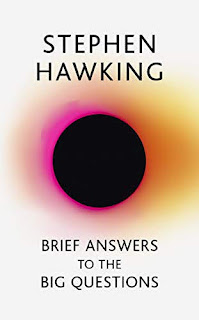Stephen Hawking Brief Answers to the Big Questions
‘Newton gave us answers. Hawking gave us questions. And Hawking’s questions themselves keep on giving, generating breakthroughs decades later. When ultimately we master the quantum gravity laws, and comprehend fully the birth of our universe, it may largely be by standing on the shoulders of Hawking.’ So said Professor Kip Thorne in 2018 at the interment of Stephen Hawking’s ashes between Newton and Darwin in Westminster Abbey under a stone engraved with Hawking’s equation linking for calculating the temperature of a black hole.
The final work of cosmologist and disability campaigner Stephen Hawking, more penetrable than his earlier popular work ‘Brief History of Time’, addresses these questions: Is there a God? How did it all begin? Can we predict the future? What is inside a black hole? Is time travel possible? How do we shape the future? Will we survive on Earth? Is there other intelligent life in the universe? Should we colonise space? Will artificial intelligence outsmart us? The first six answers brim with astronomical terms, the last four draw on wider wisdom and are easier reading. All the questions are captivating even if the answers given vary in substance on account of using a rigorous scientific approach to issues at times beyond human research or imagination.
Hawking speaks with academic authority heightened by the moral authority he’s carried living with motor neurone disease. ‘We could have a base on the Moon within thirty years, reach Mars in fifty years and explore the moons of the outer planets in 200 years’ he writes. ‘The only way to get from one side of the galaxy to the other in a reasonable time would seem to be if we could warp space-time so much that we created a little tube or wormhole. This could connect the two sides of the galaxy and act as a shortcut to get from one to the other and back while your friends were still alive’. His friend the entrepreneur physicist Yuri Milner relates in the appendix. ‘In 2016, Professor Hawking joined me in New York to launch a new project, Breakthrough Starshot: the first practical attempt at interstellar travel. Our approach, if it proves feasible, will borrow a trick from sailboats, leaving the fuel behind and harnessing an external force. The idea is to focus a powerful light source on an ultra- thin ‘lightsail’, driving a space probe, weighing about a gram, to a fifth of light speed. Starshot’s robotic probe would take about twenty years to reach Alpha Centauri. It wouldn’t allow humans to walk among the stars – but it would carry our footprint to them. It could be our first step towards becoming a galactic civilisation’.
Undoubtedly Hawking's greatest achievement was weaving together the two great scientific theories of the twentieth century, quantum theory and the theory of relativity to demonstrate the compacted masses known as black holes aren’t completely black i.e. non emitters of radiation but emit what is now called Hawking radiation. He has proved, as humbly he writes, that ‘The human mind is an incredible thing. It can conceive of the magnificence of the heavens and the intricacies of the basic components of matter. Yet for each mind to achieve its full potential, it needs a spark. The spark of enquiry and wonder. Often that spark comes from a teacher’. He pays tribute to his own inspirational teacher as we readers of this last testament are sparked by Hawkings himself into thinking ahead for ourselves and the cosmos.
So few words on such immense topics are bound to have inconsistencies. He is optimistic about Artificial Intelligence serving to eradicate disease and poverty and developing nuclear fusion whilst admitting our best hope is finding other planets on which to live. On theology he claims, as discoverer with Roger Penrose of the Big Bang, that since time has a beginning No One can exist before it which many would challenge philosophically. Unlike Einstein whose comment ‘God doesn’t play dice’ hints at purposive wisdom underlying creation Hawking says if there’s a God, which he doubts, he’s got to be a gambler. ‘The universe is like a giant casino with dice being rolled, or wheels being spun, on every occasion’. At the same time he says if he met God ‘I would like to ask however did he think of anything as complicated as M-theory in eleven dimensions’!
‘Brief Answers to the Big Questions’ is a bold thesis from a great mind who, though an inspiration to thousands, admits his main sustenance is in loving and being loved. ‘I have experienced highs and lows, turbulence and peace, success and suffering. I have been rich and poor, I have been able-bodied and disabled. I have been praised and criticised, but never ignored. I have been enormously privileged, through my work, in being able to contribute to our understanding of the universe. But it would be an empty universe indeed if it were not for the people I love, and who love me.’
Stephen Hawking Brief Answers to the Big Questions
John Murray 2018 Kindle edition £7.99 ASIN: B07D2ZKPL2 256pp



Comments
Post a Comment